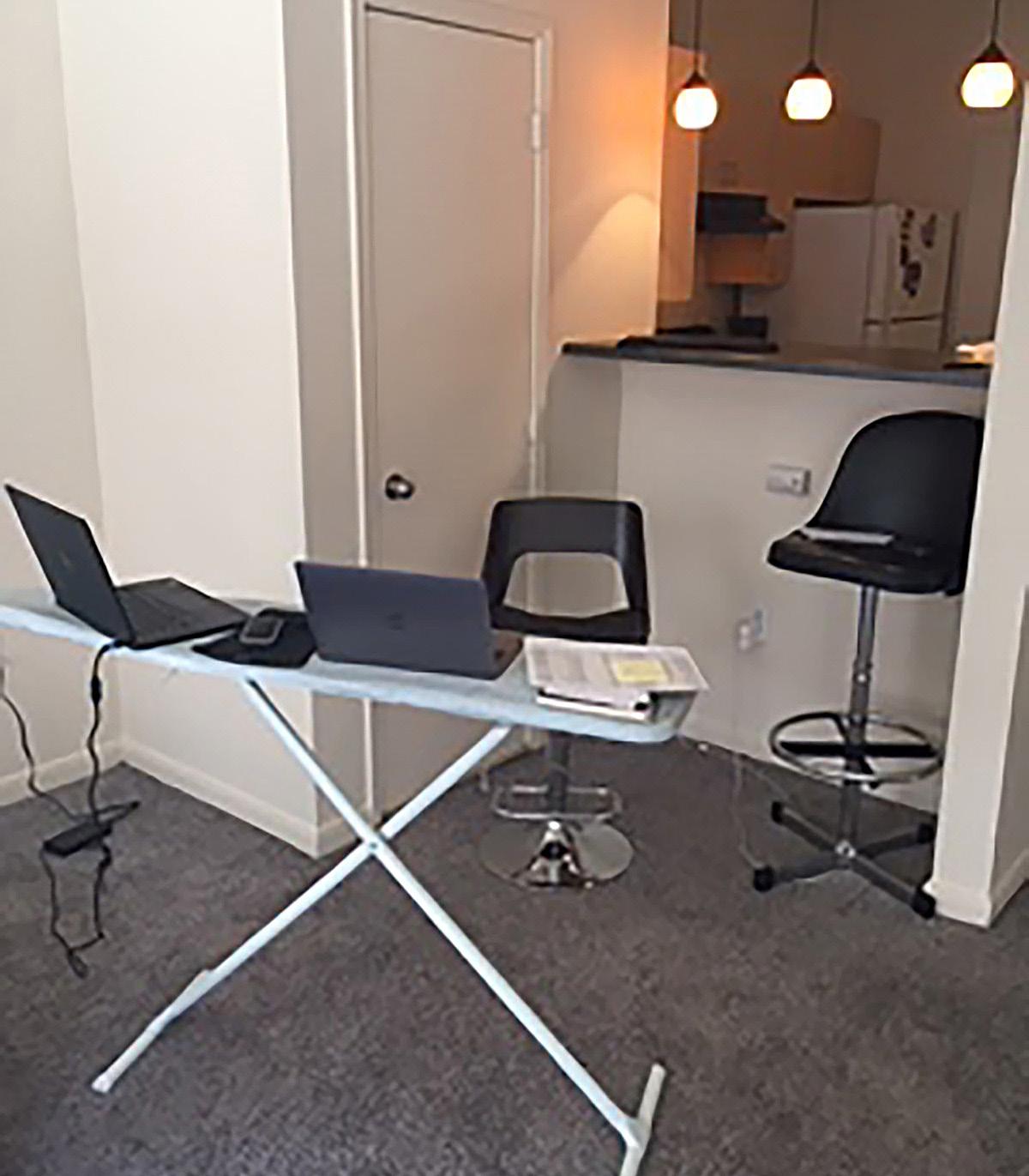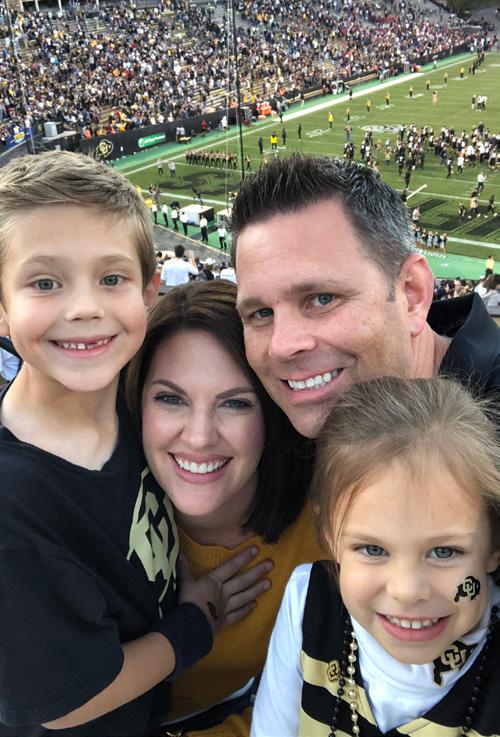
7 minute read
THE ART OF BALANCE
COLAP WELLBEING CORNER | BY ASHLEY BALDWIN
BALANCE
2020was a difficult year for a variety of reasons and, for many professionals, it highlighted the difficulty of finding a work-life balance and emphasized the need for one. Whether you are a parent or not, most people’s obligations have increased as the methods of communication and work flow we use have shifted. Most of us are pulled in multiple directions every day. Thankfully, there are simple, free techniques we can use to feel in more control and balanced. When I became pregnant with my first child, a respected colleague told me, “Once you have children you will never feel like you are able to give 100% to being a mom and/or 100% to being a therapist.” At the time, hearing this felt discouraging, as it might for any new parent, but it was one of the best pieces of advice I’ve received. Balancing work and home life is tough, especially when children or other family members are involved. Work constantly needs you and home always needs you. This isn’t meant to be discouraging but rather to emphasize the need for finding balance.
Why Is Balance Important?
We know stress has multiple effects on us and can actually create biochemical responses in our brain. A Harvard study published in August of 2018 showed that the effects of stress include memory loss and changes in our mood, as well as the creation of anxiety and depression, which can promote inflammation, which in turn impacts heart health.
Think back to the year 2020 for a minute (I am currently writing this at the end of 2020, so the optimist in me is hoping that 2021 has significantly calmed down by the time you are reading this). This was the year of stress. We underwent multiple changes and had to quickly adapt to new situations. During this time, did you find that it was hard to remember things? Did you find that you could easily forget what you were about to say or what someone was saying to you? A study in the Washington Post found that only three months into the COVID-19 pandemic, half of Americans were reporting that the pandemic was negatively impacting their mental health. One federal hotline for substance abuse and mental health reported a 1,000% increase in calls in April of 2020, compared to April of 2019. If you have found that over the last year you have experienced increased anxiety or depression and have had a harder time finding balance, you are not alone.
Here are some tips to cultivate balance regardless of where you are working.
Schedule fun things and self-care into your calendar. For many professionals, we live by our schedule, so we can use it as a tool for increasing self-care. When we block off time on our calendar for personal appointments, exercise, or a lunch break, we are more likely to take it and not plug a
meeting in. Without scheduling self-care, we often ignore it and it doesn’t happen. I suggest scheduling that hour lunch or other personal time during the middle of the week, or maybe blocking off your workday at an appropriate time.
At home, create fun traditions with your roommates or family. Schedule a standing Friday movie and pizza night that everyone can look forward to. If you know this is happening and that your kids or loved ones look forward to it all week long, you will be less likely to work late or schedule a work event that will take you away from this.
Find a balance between the enjoyable coping skills and the necessary coping skills. We all deserve to take care of ourselves and by doing so we are better for the important people around us and better in our professional lives. Coping skills are sometimes the enjoyable things like spa days or 18 holes of golf. Sometimes they are also checking things off your to-do list so that you are less stressed. Taking care of yourself and making yourself a priority will help you to feel more balanced and will help you prioritize things in a way which allows you to be more present at home.
Give yourself grace. This is probably the most important tip. Whether you are still working at home or back in the office, finding a balance is hard. You may feel like you are failing at work one day and the next day you may feel like you are failing at home. Pick what is crucial in that moment and understand that you can’t be perfect. You will always be juggling multiple balls in the air — work, relationships, self-care, etc. Some of these balls are plastic and some are glass and it is important to know which are which. You can drop the plastic ones and pick them up later and they will be okay, but you can’t put the glass ones back together. Do you have a big trial next week? This may be your glass ball for a week and you may have to drop some plastic balls, such as helping with homework every night. Does your child have a big concert or sporting event? Then this may be your glass ball that day and the emails at work may be the plastic balls. Understanding which are which can help you prioritize while also giving yourself grace.
Refine that office space. Create a space that supports your productivity regardless of where that space resides. If you are still working from home, it may not be a true home office (mine has been my dining room table), but create a space where you can organize your things. Not being able to find what you need is going to create more stress regardless of where you are and now is a great time to consider what has or has not been working and to modify accordingly. Maybe add an extra plant or aromatherapy to your space. If you do work from home, capitalize on this to set yourself up in a space with natural light that also allows you to look outside. Your brain and eyes will thank you and you may get some extra vitamin D, which we think can help with depression and anxiety.
Create and honor working hours. Driving to work creates a barrier between work and home. When we work from home, there is not a separation between the two. Whether it is due to working from home or simply modern technology, when everything you need for work is sitting at your fingertips, it is easy to keep working long past when your workday should be done. To help with this, I suggest having a mental commute. Schedule in twenty to thirty minutes before and after your workday to check out from work and ensure you are not doing things around the house during this time. Go for a short walk, enjoy a cup of coffee, workout, read, meditate, anything to help signal that you are starting or ending your workday. Regardless of where you are working, allow yourself to clock out at the end of the day. Just because you have access to your work doesn’t mean you need to be working non-stop. We know definitively that this does not promote long-term sustainability for anyone.
Working from home has become a new normal for most people and has created new difficulties in finding balance in our lives. The silver lining in this is that we have been forced to adapt and evolve towards a much needed, more balanced state. Finding a work and home life balance allows us to feel better about our roles at work and home, decreases our stress, and improves our mental wellbeing. However, this is hard and takes practice. Think about setting appropriate goals to help with this and sharing these goals with the people around you to help hold you accountable. This is a constant struggle and no one is perfect at it, but a little bit of balance can go a long way!
If you would like support creating and executing goals to move your balance forward, consider contacting your Colorado Lawyer Assistance Program for a free and confidential wellbeing consultation at 303-986-3345 or info@ coloradolap.org.
ASHLEY BALDWIN is a licensed professional counselor and a level II certified addiction counselor. She has worked in the counseling field since 2008 and established her private practice in 2018. Ashley specializes in perinatal mental health and, among other client issues, works with parent-related stress, anxiety, and struggles. For more information, contact Ashley at 719-3442209, ext. 3, or BaldwinCounselingCO@ gmail.com. SARAH MYERS, executive director of the Colorado Lawyer Assistance Program, is the coordinating editor of this wellness series. Contact COLAP for free and confidential assistance at 303-9863345 and info@coloradolap.org.










